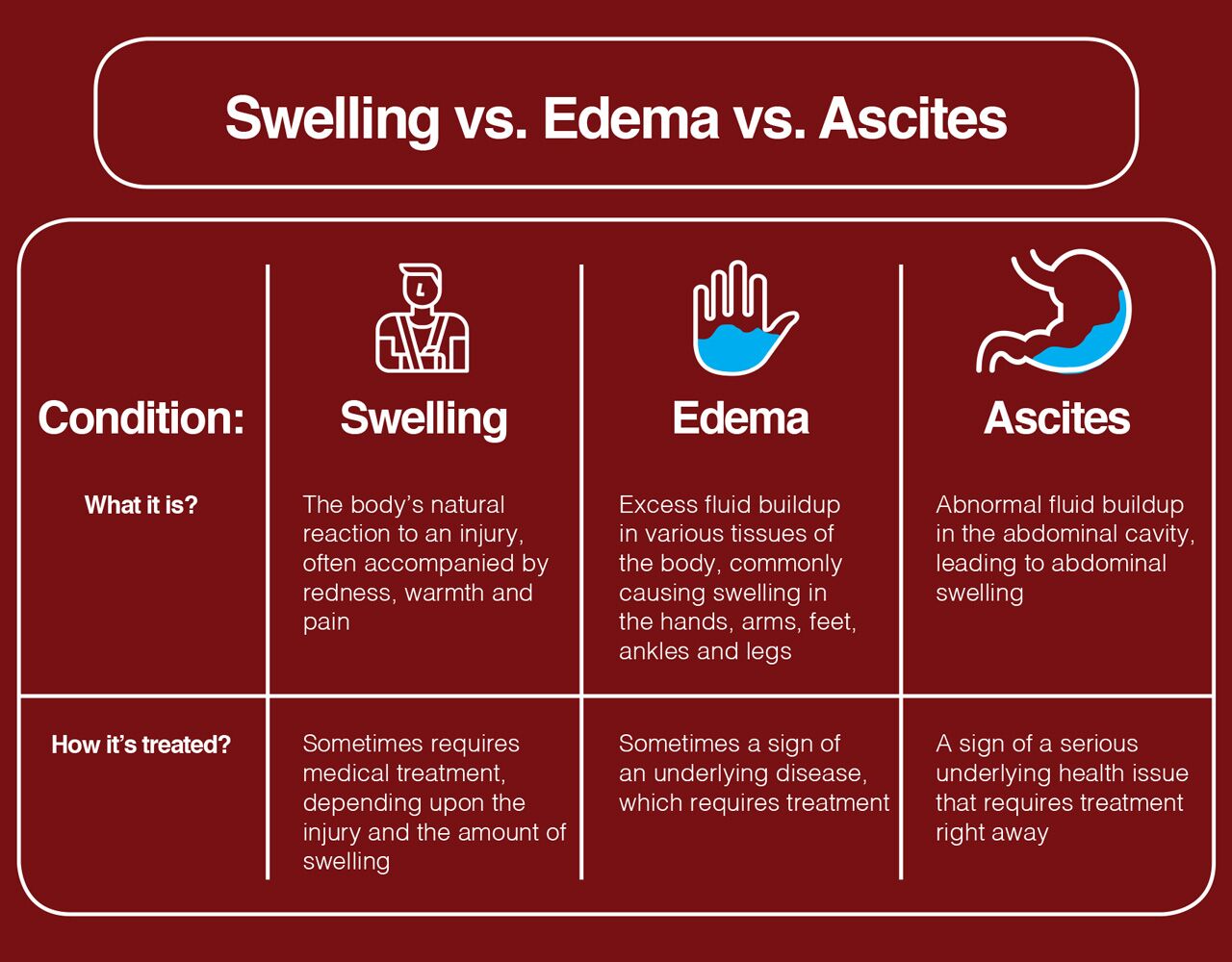Ascites: Symptoms, Causes and Treatment for Fluid in the Abdomen
 By: by Amino Science
By: by Amino Science

The occasional bloating or weight gain can be a normal occurrence. Several factors can cause the belly to suddenly expand, including eating certain foods, illness, or premenstrual syndrome in women. But if you have an underlying health condition with your liver, kidneys, or heart, abdominal swelling could be a sign of ascites.
Ascites is a medical term that means abnormal fluid buildup in the abdomen. It is a serious condition that should receive attention right away. We’re here to share the causes and symptoms of ascites so you can stay informed and be proactive with your health should any ascites symptoms pop up.
Causes of Ascites
Doctors believe the cause of excess fluid in the abdomen is a disruption in normal blood flow to the liver. If the blood vessels inside the liver experience an increase in pressure (a condition called portal hypertension), fluid may be redirected into the abdomen.
It’s important to understand that ascites itself is not a medical condition but rather a symptom of an underlying medical condition. Various underlying conditions may cause ascites, most of them relating to issues with the heart, liver, or kidneys.
Liver damage is considered the primary cause of ascites. According to the American College of Gastroenterology, cirrhosis of the liver is the most common type of liver damage that leads to ascites. Liver damage may also be caused by prolonged alcohol use or hepatitis B or C.
If cirrhotic ascites develops in a patient with liver disease, it usually indicates that the disease has progressed to late stage. The patient may be considered for a liver transplant at that point.
Other health conditions that may cause ascites include:
- Pancreatitis
- Heart failure
- Kidney failure
- Hypothyroidism
- Tuberculosis
- Certain cancers:
- Peritoneal cancer
- Bowel cancer
- Breast cancer
- Stomach cancer
- Ovarian cancer
- Pancreatic cancer
- Lung cancer
- Liver cancer
- Endometrial cancer

Ascites Symptoms
Ascites often happens gradually, though it can sometimes occur quickly. So symptoms may appear suddenly or may go unnoticed for a few weeks. Ascites symptoms are the same as those of several other health conditions. Unless there is a known underlying health condition, ascites symptoms may initially be misdiagnosed or dismissed as something not concerning. But ascites is a serious indication that something is not working properly, and symptoms should never be ignored.
If you experience any of the following symptoms, speak with your doctor about the possibility of ascites or other potential health issues.
- Fatigue
- Sudden weight gain
- Bloating
- Nausea and/or vomiting
- Swollen/distended stomach
- Shortness of breath/difficulty breathing
- Decreased appetite
- Abdominal discomfort/pain
- Back pain
- Constipation
- Frequent urination/urgent urination
- Heartburn

Diagnosing Ascites
If you have a heart condition or another health condition such as liver disease and begin to experience the symptoms listed above, such as abdominal pain and loss of appetite, your doctor will likely suspect ascites and order tests to confirm the diagnosis. Common methods used to confirm an ascites diagnosis include a physical exam of the abdomen, an ultrasound of the abdomen, and a fluid sample from the abdomen.
If the symptoms of ascites are present but there is no known underlying health condition, then your doctor will order a series of tests to diagnose the underlying condition causing the ascites. These tests typically involve checking the condition of the liver and liver function since liver damage is the most common cause of ascites. Your doctor may also order some of the following tests to diagnose your condition.
- Physical exam and full medical history including:
- Previous liver problems
- Previous hepatitis diagnosis
- Previous cancer diagnosis
- Alcohol use
- Medication history
- Family history of issues with the liver, heart, kidneys, or cancer
- Ultrasound
- CT scan
- Blood tests:
- A complete metabolic panel
- A complete blood count
Ascites Treatment
The prognosis of ascites mainly depends on how far the underlying condition has advanced. If that condition can be treated, then the ascites should improve. We’ve curated a list of common treatments for health conditions that cause ascites.
Diet
Restricting salt (sodium) and increasing the amount of water in your body is a large part of treating ascites, particularly when caused by cirrhosis of the liver. Diuretics are often prescribed to help increase water intake. Increasing water intake helps combat the buildup of fluid by expanding the amount of urine and fluid leaving the body, as well as the amount of salt being filtered out of the body. While most people don't react adversely to diuretics, they have been known to cause side effects, such as sleep disturbances, skin issues, low blood pressure, and exhaustion, in some individuals.
Paracentesis
In late-stage cases of liver disease or other conditions in which salt restriction and diuretics are not helping the ascites, paracentesis is the next step in treatment. Paracentesis is the process of removing large amounts of fluid from the abdomen. Therapeutic paracentesis is done by inserting a needle into the abdominal cavity to extract the fluid.
Liver Shunt
If a patient is not responding to ascites treatment, a shunt may be surgically placed inside the patient’s liver. A shunt is a tube that redirects blood flow to reduce the blood pressure in the liver and thereby reduce fluid retention in the abdomen. A shunt is a permanent procedure that remains in the liver once placed.
Amino Acids
A study published in Molecular Medicine Reports revealed that branched-chain amino acid supplements were successfully used to treat a patient who was suffering from severe ascites due to liver cirrhosis. Amino acids are often referred to as life’s building blocks because they help form protein, tissue, and chemicals the body needs to function properly. According to this study, amino acid supplements may also be used to treat ascites. When using amino acid supplements, it’s best to take a balanced mixture of all essential amino acids, not just the branched-chain amino acids, to make sure that the blood concentration of amino acids is optimal and to maximize the beneficial effects.
Liver Transplant
When all other means of treatment have been exhausted, a patient will often be evaluated for a liver transplant. The American College of Gastroenterology states that patients who develop ascites already have a severe problem with their liver, such as liver failure. While the treatments listed above may help relieve ascites symptoms, the primary issue that needs to be treated is the deterioration of the liver. Often liver deterioration is so severe by the time ascites sets in that a patient will require liver transplantation to have a chance at full recovery.

Up to 25% off Amino
Shop NowTAGS: conditions
Join the Community
Comments (0)
Most Craveable Recipes




 833-264-6620
833-264-6620




















